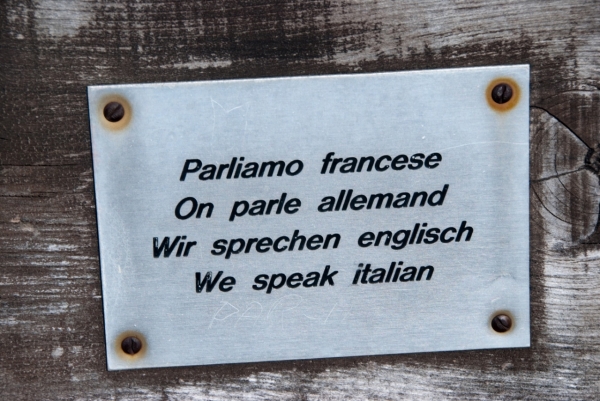Don't miss out on the best jobs!
Subscribe to HelpGoAbroad and weekly we will sent you an email with latest job posts. Provide your email address below
The study abroad experience is more than just what you learn in the classroom. It’s about the cultural immersion, meeting people from all over the world, the opportunity to explore corners of the world previously unknown and broadening your knowledge of the world we live in. One great way to enhance your study abroad experience is to learn a foreign language. Whether it’s the native language of your study abroad destination or a language you’ve been dying to learn for years, there are numerous benefits to learning a foreign language that won’t just enrich your time away studying abroad, but will in fact stay with you for years to come.
It improves your communication skills
Starting off with the most obvious point first, speaking a foreign language aids your communication skills. Making an attempt to learn a foreign language goes a long way, especially when you are travelling or living in the country. You will constantly try to figure out the clearest way to convey what you mean and over time, you will find you’re communicating more succinctly and more effectively. Being more creative with your vocabulary and using different ways to express yourself will dramatically develop how you communicate on a daily basis. Learning a language also makes you a better listener as you have to listen more intently to what another person is saying. In a world where people fight to get a word in edgeways, being a good listener is often an underestimated but hugely valuable skill.
It is a huge learning curve
When you’re faced with the language barrier and you’re unsure of how to say something in the language of choice, you have to come up with different ways to confront and overcome it. Is there another way you can say it? Can you describe it? If all else fails, can you mime it? Language learning embodies the age old cliché of thinking outside the box. The constant challenge of breaking through the language barrier means your brain goes into overdrive, thinking up new tactics and solutions to resolve the communication breakdown. Learning a foreign language improves more skills than purely interpersonal - it develops your decision making, your perceptive skills, your problem-solving and much, much more.
It deepens your cultural understanding
Once you start getting to grips with a language, you have a more profound understanding of its culture. Language is a huge component of what makes a society, a culture or a country tick and discovering their colloquialisms and expressions are a doorway to comprehending their customs, traditions and sense of humour. You can also access the media, the arts and social media without having to resort to Google Translate, which gives you a unique perspective into everyday life. Learning a language gives you a broader and more global outlook, allowing you to gain some valuable insight in worldwide goings-on.
You have a better understanding of English
When you learn another language, you discover new things about your native language too. Whilst you’re getting to grips with the subjunctive or whatever grammatical stumbling block it may be, you will constantly compare and contrast with English grammar, sentence structure and conjugations. This will help you to have a deeper understanding of your native language as well as aid you to communicate more articulately and clearly both when speaking and writing in English. Such skills will come into much use throughout your career and your personal life too.
It enhances your CV and business acumen
Graduates with language skills are few and far in between when it comes to native English speakers and standing out from the crowd is essential to get noticed by prospective employers. Language skills say to recruiters that you have an understanding of its markets, how they conduct business and demonstrates that you have the skills to be able to negotiate with new and current business partners. It’s not just the language skills that are desirable to employers, it’s also the initiative to use your study abroad experience to the max and take away important life skills that will come in handy every step of your career.
You open yourself up to new opportunities
Because you’ve already made the effort to speak the native language, you will find as a general rule of thumb people open up to you more. This means you will get insider information that you otherwise wouldn’t know and you may even be lucky enough to get invited to events that you would never have heard about. This in turn is a win-win situation, you get to further improve your language skills by immersing yourself in the language and culture as well as experience a unique event, which may be an adventure to remember for years to come. It makes the struggle and challenge of breaking through the language barrier worth it.
It makes travel easier
You can save time and energy rushing about trying to find an English speaker to give you directions. You can pick up what the announcements say in public places. Ordering food or buying tickets are a walk in the park in comparison to if you solely relied on English. And you can make small talk to fill those awkward silences. Basically, all of the essential components that make up travelling are made so much easier when you take time to learn essential phrases to aid your travels.
You’re more street-wise
Never underestimate the power of language skills, especially when people think you don’t understand. Having knowledge of the local language allows you to barter with street vendors and taxi drivers, which gets you better deals, saves you money and reduces the likelihood of getting scammed. It also means you can stay sharp to what others are saying around you, which in the case of an adverse event, could help out greatly. You can also take advantage of advice helpful locals offer you too. Although English is widely regarded as the universal language, breaking down the language barrier and using your language skills really comes into play, especially in the cases above.
The amount of reasons and benefits of learning a language could go on but the eight reasons above are a good start. Language skills give you a global perspective, highly desirable professional skills and it enhances your travels as well as your study abroad experience. Seize the opportunity to give learning a foreign language a go, because it’s highly likely in years to come, you’ll kick yourself if you didn’t try. You never know, you may find you’re a budding linguist and come back with a foreign language under your belt in addition to having had an incredible study abroad experience.
Sign in to publish a comment




Be the first to comment on this post.